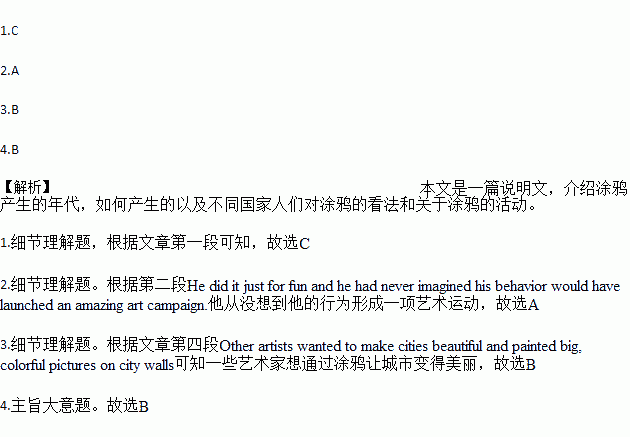题目内容
Modern graffiti began in big cities in the United States in the 1970s. In New York, young people wrote their names, or 'tags', in pen on walls around the city.
One of the first 'taggers' was a teenager called Demetrius. His tag was TAKI 183. He wrote his tag on walls and in stations in New York. He did it just for fun and he had never imagined his behavior would have launched an amazing art campaign. Other teenagers saw Demetrius's tag and started writing their tags too. Soon, there were tags on walls, buses and trains all over New York.
Then, some teenagers started writing their tags with aerosol paint. Their tags were bigger and more colourful. Aerosol paint graffiti became very popular in the 1970s and 1980s. It appeared on trains, buses and walls around the world.
In the 1990s and 2000s, a lot of graffiti artists started painting pictures. Some artists' pictures were about politics. Other artists wanted to make cities beautiful and painted big, colorful pictures on city walls.
In some countries, writing or painting on walls is a crime. Sometimes, graffiti artists have problems with the police. In other countries, artists can draw and paint in certain places. For example, in Taiwan, there are 'graffiti zones' where artists can paint on walls. In S?o Paulo in Brazil, street artists can paint pictures on walls and houses. Their pictures are colorful and beautiful. Some tourists visit S?o Paulo just to see the street art!
In Bristol in the UK, there is a street art festival in August every year. Artists paint all the buildings in a street. Lots of people come to watch the artists and take photos. You can see exhibitions of street art in some galleries too. There have been exhibitions of street art in galleries in Paris, London and Los Angeles.
1.How did graffiti probably begin in New York?
A. An artist drew a picture on the wall.
B. An art campaign about graffiti was held.
C. A teenager wrote his tag on walls and in stations.
D. Many teenagers gave out tags on buses and trains.
2.What can we learn from the text?
A. The tags-writing has grown into a form of art.
B. Aerosol paint graffiti is the most popular type.
C. Street art is sure to attract more people in the future.
D. Street artists prefer to communicate with others online.
3.Some graffiti artists paint pictures to .
A. indicate they were tired of the political life
B. help beautify the city they are living in
C. change people’s outdated art values
D. encourage the teenagers to love arts
4.What does the text mainly tell us?
A. A young man with artistic ideas.
B. The development of street art.
C. Why people like street art.
D. How to become a street artist.
 冲刺100分1号卷系列答案
冲刺100分1号卷系列答案 期末好成绩系列答案
期末好成绩系列答案| A. | the;/ | B. | a; the | C. | the; a | D. | a;/ |

